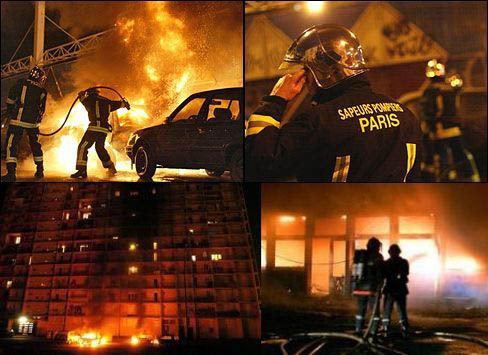 |
VanRamblings first became aware of the divide between Muslim Arab immigrants and the majority French population seven years ago during a screening of Jeanne and the Perfect Guy when, in the film’s opening scene, the Muslim, Arab and black janitorial staff at a chic Paris travel agency break out into song decrying the exploitative treatment each experiences at the hands of the French, and the pervasive sense of exclusion each feels, their diaspora to France hardly welcome despite the necessity of their labours.
Now, in fall 2005, after almost two weeks of violent clashes between youth and police, as the world looks on in stunned disbelief at the destruction of the social fabric in France, many of us our looking for answers as to why “a tsunami of inchoate youth rebellion” is engulfing France.
As Doug Ireland writes in his piece, Why Is France Burning? The Rebellion of A Lost Generation, “To understand the origins of this profound crisis for France, it is important to step back and remember that the ghettos where festering resentment has now burst into flames were created as a matter of industrial policy by the French state.”
It is the result of thirty years of government neglect: of the failure of the French political classes — of both right and left — to make any serious effort to integrate its Muslim and black populations into the larger French economy and culture; and of the deep-seated, searing, soul-destroying racism that the unemployed and profoundly alienated young of the ghettos face every day of their lives, both from the police, and when trying to find a job or decent housing.
In the course of his essay, Ireland suggests that the events of the past two weeks can be attributed to institutionalized racism and a long, inglorious exploitation of 10% of the population who have consistently been locked out of political decision-making, and denied access to basic education, housing and social services. The history of such treatment of the Muslim, Arab and black population dates back almost a half century.
During the post-World War II boom years of reconstruction and economic expansion, the government recruited labourers and factory and menial workers from France’s foreign colonies. These immigrant workers, primarily from North Africa, were desperately needed to allow the French economy to expand due to the shortage of manpower caused by two World Wars, killing many French men, and slashing native French birth-rates. Moreover, these immigrant workers were favoured by industrial employers as passive, unlikely to strike and cheaper to hire. Literacy, too, was a disqualification, because an Arab worker who could read could educate himself about politics and become more susceptible to organization into a union.
Upon arrival and since, these Arab workers were and are warehoused in huge, high-rise low-income housing ghettos — known as cités (Americans call them ‘the projects’) — specially built and deliberately placed out of sight in the suburbs so that their darker-skinned inhabitants wouldn’t “pollute” the larger metropolitan centres. Now 30, 40, and 50 years old, these high-rise human warehouses in the isolated suburbs are dilapidated, sinister places, housing the hopeless and the alienated, an undereducated, oppressed and rage-filled population of the dispossessed.
Activist Naima Bouteldja, writing in The Guardian, says that twelve “nights of consecutive violence following the deaths of two young Muslim men of African descent in a Paris suburb shows that a dark vision of a ghettoised, post-colonial France is now upon us.” In fact …
In late 1991, after violent riots between youths and police scarred the suburbs of Lyon, Alain Touraine, the French sociologist, predicted: “It will only be a few years before we face the kind of massive urban explosion the Americans have experienced.”
Bouteldja writes that Clichy-sous-Bois, the impoverished and segregated north-eastern suburb of Paris where the two men lived and where the violent reaction to their deaths began, was a ticking bomb for the kind of dramatic social upheaval we are currently witnessing. Half of its inhabitants are under 20, unemployment is above 40% and identity checks and police harassment are a daily experience.
Police violence and racism are major factors, she writes, contributing to the current social malaise in France. “In April, an Amnesty International report criticised the “generalised impunity” with which the French police operated when it came to violent treatment of young men from African backgrounds during identity checks.”
Bouteldja has a prescription as to how to begin to work towards a resolution to the current impasse.
How can France get out of this political race to the bottom? It would obviously help for ministers to stop talking about the suburbs as dens of ‘scum’ and for (Interior Minister, Nicolas) Sarkozy to be removed: the falsehoods he spread about the events surrounding the two deaths and his deployment of a massively disproportionate police presence in the first days of the riots have again shown his unfitness for office.
The morning after the gassing of the mosque, a young Muslim woman summed up a widespread feeling: “We just want them to stop lying, to admit they’ve done it and to apologize.” Problems don’t go away when you ignore them. The weight of world opinion must come to bear on France, and pressure must be put on the French government to work towards transformation of their relations with the Muslim population, and recognition of their immigrant population as full and equal citizens of the republic.